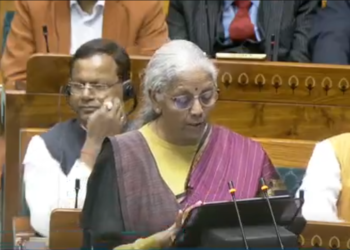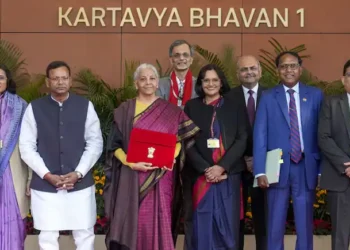Calling it a betrayal of tribal autonomy, IPP warns that land rights are being mortgaged by Assam’s Autonomous Councils under pressure from the state and corporate interests.
BY PC Bureau
June 22, 2025 — The Indigenous Peoples Party (IPP) has demanded the immediate cancellation of a controversial land deal between the North Cachar Hills Autonomous Council (NCHAC) and the Adani Group for a cement plant in Umrangso, alleging that it violates constitutional protections for tribal lands under the Sixth Schedule.
At a press conference on Friday, IPP chief convenor Rajen Timung accused the NCHAC of illegally transferring 9,000 bighas of tribal land to Adani, which he warned could displace over 14,000 families from Karbi, Dimasa, Naga, and Adivasi communities. He called on NCHAC Chief Executive Member Debolal Gorlosa to revoke the allotment and issue a formal apology to the National Commission for Scheduled Tribes (NCST).
Following a complaint from the IPP, the NCST had issued a notice on June 13 to the Dima Hasao Deputy Commissioner seeking an Action Taken Report within seven days. The commission warned that non-compliance could trigger its powers under Article 338A of the Constitution, including summons for personal appearance.
READ: As Army Accepts Blame, Manipur Police Exposed Over Crossfire Claim
g rubber stamps for the state cabinet,” Timung said. “They are surrendering constitutional authority meant to protect our land.”
National Commission for ST has issued a notice to #DimaHasao DC, demanding an Action Taken Report within 7 days regarding the alleged illegal allotment of 9,000 bighas of tribal land in #Umrangso for #Adani‘s mega cement plant project. @dmdimahasao https://t.co/hZud54oO6t
— GPlus (@guwahatiplus) June 18, 2025
A Pattern of Illegal Transfers
Timung also slammed the Assam government’s wider pattern of land giveaways to corporations. He cited recent land deals in West Karbi Anglong and Kokrajhar, where thousands of bighas have been allocated to companies like Greenko and Adani, allegedly with passive endorsement from KAAC and BTC.
Taking direct aim at Assam Cabinet Minister Nandita Gorlosa, he asked why she supported a deal that affects her home district.
“If you can’t defend tribal rights, you have no moral right to be a minister,” he said.
He further accused the state of using tribal land as collateral for loans from the World Bank and private investors, with the BTC, NCHAC, and KAAC enabling this by failing to assert their constitutional powers.
“Why are our Councils not negotiating directly with companies? Why are they allowing the state to mortgage tribal futures?” he asked.
READ: Sonia Gandhi Slams Modi Govt’s Silence on West Asia Crisis
Development Yes, Dispossession No
The IPP clarified it is not opposed to development. Timung pointed to a June 3 MoU with Numaligarh Refinery Limited (NRL) as an example of responsible planning, where the tribal council retains land ownership, earns 42% profit share, and secures 70 jobs for locals.
By contrast, he called the Adani and Greenko deals “opaque, top-down, and unconstitutional.”
Crisis in KAAC: Corruption and Power Centralization
Timung also flagged growing dysfunction within the Karbi Anglong Autonomous Council (KAAC), alleging financial mismanagement, centralization of power, and exclusion of elected members from governance.
“Only a handful of contractors get paid. The council functions like a private company,” he said.
A Deafening Silence
The IPP chief expressed dismay at the silence of major political parties and civil society groups, accusing them of complicity or cowardice.
“It’s time to stand up for our land, our people, and our Constitution. These councils were created to protect us—not to broker corporate deals behind closed doors.”
As resistance to such projects gains momentum across Assam’s tribal belts, the IPP is positioning itself as a watchdog against what it sees as state-facilitated land grabs in violation of tribal autonomy.













